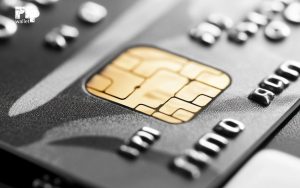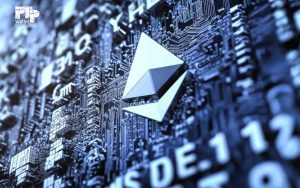Ethereum is an open-source, public, and blockchain-based distributed computing platform that enables Smart Contracts and Decentralized Applications (DApps) to be deployed. Ethereum’s own native cryptocurrency, Ether, powers the blockchain aspect of the network. It also serves as a digital “fuel” that allows users to develop apps and services that will run on its blockchain.
Originally proposed in late 2013 by Russian programmer Vitalik Buterin, Ethereum has gone on to become the second-largest cryptocurrency by market cap behind Bitcoin since its debut on July 30, 2015.
Ethereum uses the same technology as Bitcoin to store transactions—a blockchain—but also offers an advanced programming language because it’s designed from the ground up to be programmed with smart contracts.
Smart contracts are a crucial part of the Ethereum network. They are computer programs that facilitate, verify and enforce contracts between participants eliminating the possibility of downtime, censorship, fraud, or third-party interference. For example, a smart contract can be employed in representing a legal contract that mimics the logic of contractual clauses or a financial contract that specifies counterparty responsibilities and automated value flows.
These programs are designed in such a way that they cannot be changed, deleted, or interrupted once deployed. In essence, anyone who has possession of one will always have it.
The list of companies and people supporting and using Ethereum is considerable and includes both tech startups as well as established companies such as AMD, JPMorgan Chase, Microsoft, IBM, etc. Concerning the potential future use cases, the platform has attracted interest from large corporations including banks, automobile manufacturers, media organizations, and technology giants like Samsung, Sony, or SAP.
Who are the Founders of Ethereum (ETH)?
Ethereum was invented by a small group of blockchain enthusiasts that first met on June 7, 2014, in Zug, Switzerland.
Vitalik Buterin, a programmer involved with Bitcoin magazine and research at the time was the mastermind behind the project. He wanted to create an alternative type of digital platform that would not be subject to the same potential pitfalls as centralized networks like Bitcoin.
Buterin was later joined by British programmer Gavin Wood, who is arguably the second most important co-founder of Ethereum. He is well known for proposing Ethereum’s native programming language, Solidity.
Other notable mentions include Alex Van de Sande (founder of status), Canadian entrepreneur Joseph Lubin (creator of ConsenSys), Anthony Di Lorio, Charles Hoskinson, and Mihai Alisie.
What is Ethereum Used for?
Ethereum is a platform with many different uses. It is primarily designed as a platform for developers to build decentralized applications and deploy them to the real world.
While Ethereum was primarily developed to support smart contract operations, Ether, Ethereum’s cryptocurrency is also currently accepted as a means of payment by some businesses and service providers. For example, ether is accepted by Overstock, Shopify, and CheapAir, among other online retailers.
What is the Unique Point of Ethereum (ETH)?
The cryptocurrency space has been seeing more and more competitors over the past few years, and there are several major players in this space. However, what makes Ethereum unique is not necessarily its price or availability on exchanges, but rather how it differs from Bitcoin and other cryptocurrencies.
One major thing that sets Ethereum apart from other cryptocurrencies is its use of smart contracts to automate agreements among two or more parties. This feature makes Ethereum more decentralized than many cryptocurrencies including Bitcoin. It also has an open-source platform which makes it extremely difficult to control or shut down. Many think Ethereum will soon surpass Bitcoin as the most popular cryptocurrency in the world.
How many Ethereum (ETH) Coins are in Circulation?
There are a total of 116,681,089 ETH available for circulation at the time of writing this article. This is a number that goes up and down every day as Ether is continuously created or destroyed. The latest figures indicate there are currently about 382 million in circulation with an average market cap of around $2.6 billion which makes ETH the 6th most valuable currency in the world.
That implies, unlike Bitcoin (and thousands of other cryptocurrencies), there is no limit to the number of Ethers that can be traded on the open market, with the assumption that supply will grow every year as long as Ethereum exists.
Is the Ethereum (ETH) network secure?
As you begin to explore the Ethereum platform, one of the first questions you will have is whether or not it is safe. You do not just want your funds to disappear after an unfortunate hack or an accidental mistake. You want them to be safe and available for you to use.
Ethereum employs the same security mechanisms as Bitcoin does. In this approach, a massive amount of processing power provided by network nodes validates and protects every transaction, making third-party interference impossible. As a result, the Ethereum blockchain is extremely secure in terms of protecting your assets and cash.
However, as it stands right now, there is no way to ensure the Ethereum network is completely impervious or secure. The smart contracts that run on the network have several flaws that emphasize user security. Without a complete overhaul of the Ethereum protocol, it will always be vulnerable to these types of attacks.
How do I buy Ethereum (ETH) Coins?
There is a common misunderstanding among newcomers to the Ethereum network. You do not buy Ethereum; Rather, you purchase Ether which runs on the Ethereum blockchain.
Because Ethereum is the second-largest cryptocurrency after Bitcoin, it can be purchased or traded on almost all major cryptocurrency exchanges. Follow this step-by-step guide to buying Ethereum coins:
- Decide on a cryptocurrency exchange: Various cryptocurrencies are bought and sold on cryptocurrency exchanges and trading platforms. A few of the most popular exchanges include com, Binance, and Kraken. For almost everything, you will have to pay some trading or processing fee.
- Make a Cash deposit: You must fund your trading account in order to purchase Ether. To do so, you can deposit fiat money like USD, EUR, or GBP via a debit card or directly from your bank account.
- Buy Ether: After you have funded your account, you can use the funds to buy Ether and other assets at the current Ethereum price. You can keep the coins, sell them, or exchange them for other cryptocurrencies once they have arrived in your account. When you sell or trade cryptocurrencies, keep in mind that you may be subject to taxes.
- Make use of a wallet: Keeping your Ether in the default digital wallet of your trading platform could be dangerous. Someone could easily steal your coins if the exchange is hacked. Another alternative is to move coins that you would not be selling or trading anytime soon into another digital wallet or a cold wallet that is not connected to the internet.
Which Cryptocurrency Wallet Supports Ethereum (ETH)
The PTPWallet platform supports many cryptocurrencies simultaneously such as Ethereum. Because of its vast use case, it has grown to become one of the most used platforms as it serves as an exchange and an engine to discover other cryptocurrencies. Additionally, users can easily use PTPWallet as their Ethereum wallet because offers a simple and interactive interface making it easy for people to navigate its system.



